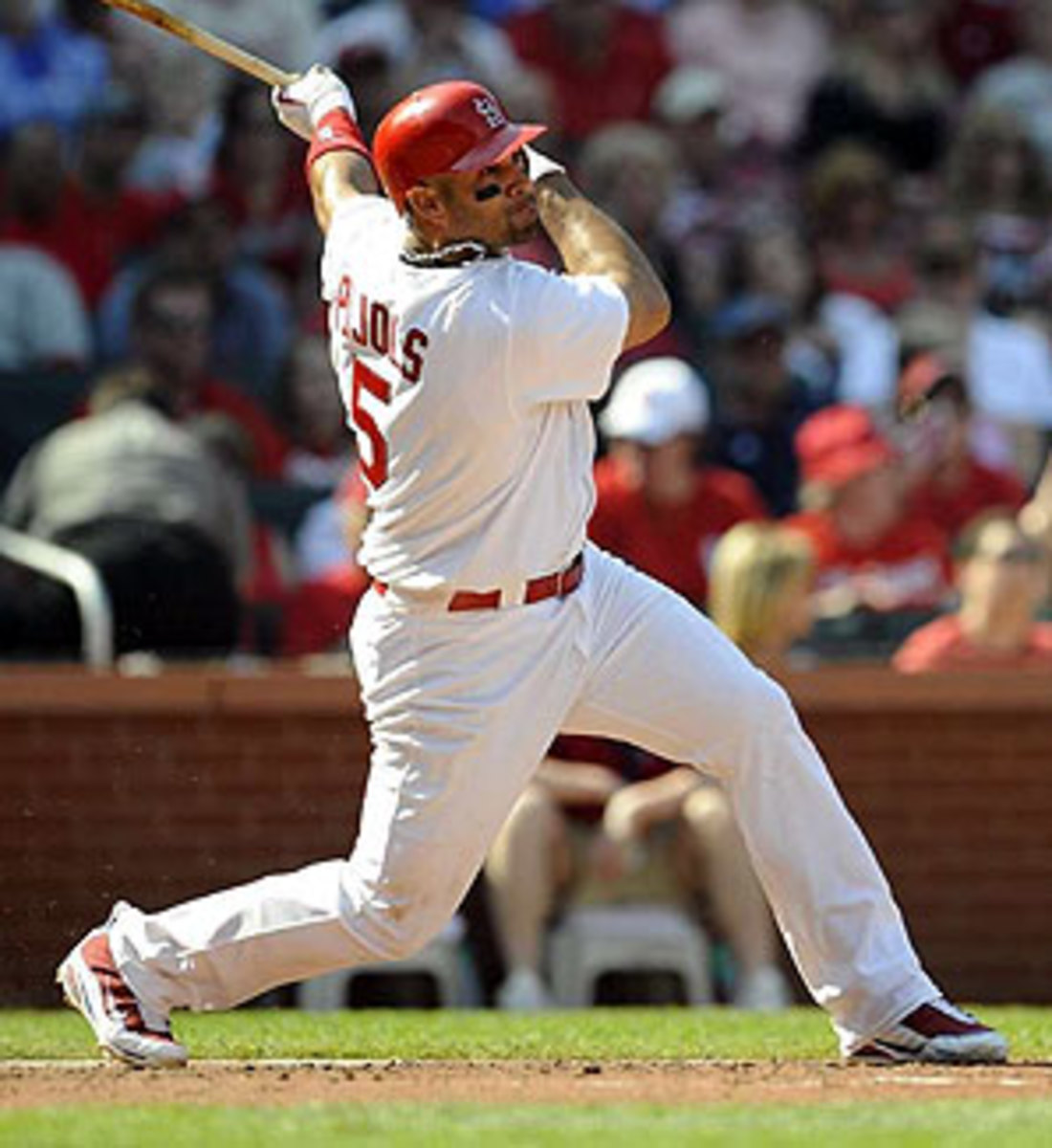
If Cardinals can't keep Pujols it's a bad sign of the times for MLB
You shouldn't be allowed to clinch the pennant in December.
The Philadelphia Phillies bought five years of Cliff Lee last Dec. 15, for $120 million. That's the going rate for minimizing hope all over the National League. It relegates to dreaming every fan who is not a Phanatic. Dreams are quantifiable in Major League Baseball. They're as obvious as a checkbook balance.
This is of no concern to fans in Philadelphia. Or to fans in Boston and New York. Problem is, baseball is played in more places than that. It's played in Kansas City and Milwaukee and Pittsburgh and Cincinnati and San Diego. It's played in St. Louis, where it is loved as much as anywhere. The Cardinals can't buy their dreams, the way the Phillies can.
If the Cardinals can't sign Albert Pujols to a contract extension by noon on Wednesday, he will play out the last year of his current eight-year deal and go looking for suitors. A guy as revered in St. Louis as any ballplayer not named Stan Musial likely will play elsewhere beginning next season. When arguably the best baseball town in America and its all-world fans can't keep a player as historically significant to them as any player they've ever had, there is a problem.
The commissioner's office can haul out every parity-friendly statistic it likes. It can put on display all the Have Not teams that have made the postseason lately. Look, even the Cincinnati Reds won their division!
What MLB can't do is deny that the Yankees can stretch to keep Derek Jeter but the Cardinals can't do the same for Albert Pujols.
Maybe that doesn't matter to you. Willie Mays didn't retire a Giant. Roger Clemens shopped himself out of Boston and all over the country. True enough. But part of loving the games is loving the players who play them. Specifically, feeling a connection to those players.
On Sunday, the St. Louis Post-Dispatch published a story with the headline, "Is Pujols Worth It?''
It's a pointless question. A ballplayer is a commodity, same as an appliance or a house. He is worth what someone is willing to pay him. But the deeper issue wasn't lost. "How do you quantify the impact any one player has on that ineffable bond between a team and its fans, which is the true economic asset of a business such as the Cardinals?'' the writer asked.
"It's a very positive outlay between player and team,'' Jim Fisher, a marketing professor at St. Louis University, told the Post-Dispatch. The Cardinals "are trying to get their story out, and Pujols helps tell that story.''
What's the story when Pujols leaves to play for the Cubs?
"It's not a good sign,'' agent Brian Goldberg said Monday. "It sets a bad precedent for teams like the Reds, Kansas City and Milwaukee.'' Goldberg's best-known client was Ken Griffey Jr., who took less-than-market money to return to his hometown Reds in 2000. Griffey also deferred half his $13 million annual salary, over 25 years. How quaint of him.
"The Brewers are planning on (Prince) Fielder's leaving'' after this season, said Goldberg. "They're making a push this year, and they'll make good use of the draft picks'' they'll get if Fielder walks after the season. "They know they'll lose Fielder. They've planned for it.''
Small-money baseball is the business of perpetual re-invention. It's about stepping lightly and always being smart, because one bad mistake can do you in for years. Parity in Baseball means that every so often, a team of limited means can do everything right for a year or two, overachieve, and never have a minute to enjoy what it has done.
I'm in Cincinnati. I have watched the Reds, over the last six or seven years, scout well, draft smartly and spend when spending was prudent. The result is a team with a three-year window of opportunity, before crushing bills come due, vital players leave and the process starts all over again.
The Reds spent mountains of cash this winter, not to improve their team, but merely to keep it highly competitive for the next few seasons. National League MVP Joey Votto signed a three-year deal worth $38 million. The most notable part of that deal is that it covers only Votto's arbitration-eligible years. He'll be a free agent after that, and if his numbers don't decline, he will leave Cincinnati faster than a Democrat.
To compete, the Reds can't ever stop to take a breath. More cheap, highly talented kids have to be cranked out of the farm system, to replace the stars who inevitably leave. Joey Votto will never be the king in Cincinnati, the way Pujols is in St. Louis. Baseball's economics won't allow it.
There is a good chance the Cardinals will lose King Albert. Reportedly, it isn't the dollars; it's the length of the deal. The team has offered him seven years; Pujols wants a decade. Maybe some team will be foolish, er, flush enough to give 10 guaranteed years to a 31-year-old in the post-Steroid Era. Pujols is allowed to find out what he's worth.
There will be no joy in Budville, though. Or most anywhere else where the wallets aren't perpetually thick. Of course, the Phillies aren't locks to reach the World Series. The beauty of baseball is the truth it reveals across 162 games. It is a long season. But when you have a starting rotation of All-Stars -- Lee, Roy Halladay, Roy Oswalt, Cole Hamels -- some suspense is going to be removed.
There are too many baseball places where, beginning this week, hope is naive. Pitchers and catchers report. Optimism is back home, shivering. And Albert Pujols still hasn't signed a contract extension.





